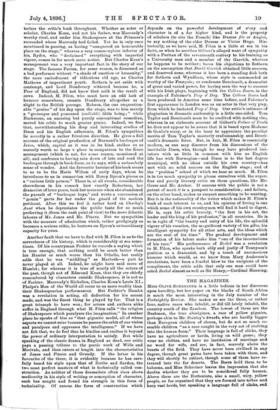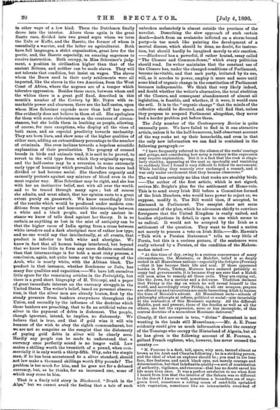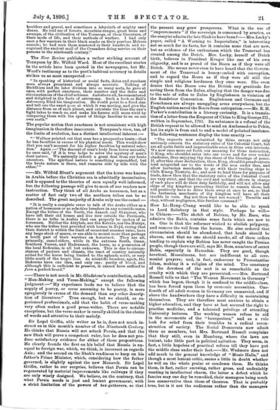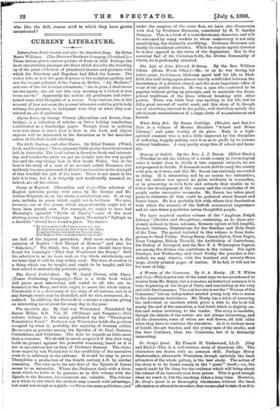THE MAGAZINES.
Miss OLIVE SCHREINER is a little tedious in her discourse upon heredity, but her paper on the blacks of South Africa. is much the most interesting in the July number of the Fortnightly Review. She makes us see the three, or rather four, native races who inhabit, or did till lately inhabit, the country south of the Zambesi. The lowest of these are the Bushmen, the true aborigines, a race of yellow pigmies, perhaps akin to Mr. Stanley's dwarfs, who are hardly bigger than European children of eleven, but do not so much re- semble children "as a race caught in the very act of evolving into the human form." Their language is fall of clicks, they have no agriculture or herds, living on wild game ; they wear no clothes, and have no institution of marriage and no word for wife, and are, in fact, scarcely above the beasts of the field. They have never been civilised in any degree, though great pains have been taken with them, and they will shortly be extinct, though some of them have re- treated into the far deserts. The Boers hold them to be baboons, and Miss Schreiner leaves the impression that she doubts whether they are to be considered fully human. Above them are the Hottentots, also a small, wiry, yellow people, so far organised that they are formed into tribes and keep vast herds, but speaking a language full of clicks, and in other ways of a low kind. Them the Dutchmen finally drove into the interior. Above these again is the great Bantu race, divided into two grand septa whom we term the Zulu or Kaffir, and the Basuto, the former of whom is essentially a warrior, and the latter an agriculturist. Both have full languages, a strict organisation, great love for the poetic, and, the Basuto especially, an amazing eagerness to receive instruction. Both occupy, in Miss Schreiner's judg- ment, a position in civilisation higher than that of the ancient Britons, and neither can be made slaves. They will not tolerate that condition, but insist on wages. The slaves whom the Boers used in their early settlements were all imported, like the slaves in the two Americas, from the West Coast of Africa, where the negroea are of a temper which tolerates oppression. Besides these races, between whom and the whites there is a great gulf fixed, described in this month's number of the Century by Mr. Bryce with re- markable power and clearness, there are the half-castes, upon whom Miss Schreiner expends more than half her space. She evidently does not believe in them at all. She apologises for them with some elaborateness as the creatures of circum- stances, but she holds them in loathing as people, allowing, of course, for rare exceptions, who display all the vices of both races, and an especial proclivity towards unchastity. They are born liars, and show none of the higher qualities of either race, adding an extraordinary percentage to the number of criminals. She even inclines towards a hopeless scientific explanation of their peculiarities. The progeny of crossed breeds in birds and animals tend, it is said to be proved, to revert to the wild type from which they originally sprung, and the half-castes may be a reversion to some extremely early type of humanity which prevailed before the races had divided or had become social. She therefore urgently and earnestly protests against any mixture of blood even in the most regular way. Miss Schreiner may be right, and she has with her an instinctive belief, met with all over the world, and to be traced through many ages ; but of course she admits, and must admit, that her opinion rests to a great extent purely on guesswork. We know exceedingly little of the results which would be produced under modern con- ditions from regular and honourable intermarriage between a white and a black people, and the only ancient in- stance we know of tells dead against her theory. It is as certain as anything so lost in the mist of antiquity can be that the higher races of India spring from a cross between white invaders and a dark aboriginal race of rather low type, and no one would say that intellectually, at all events, that product is inferior to both white and aborigine. We know in fact that all human beings interbreed, but beyond that we know too little to form any more definite conclusion than that intermarriage is for both a most risky process, a conclusion, again, not quite borne out by the crossing of the Arab, who is nearly white, with the African black. The product in that instance, whether Soudanese or Zulu, has many fine qualities and capacities.—We have left ourselves little space for the remaining articles in the Fortnightly, but there is a good short biography of M. Triconpi, and a paper of great immediate interest on the currency struggle in the United States. The writer's belief, based on personal observa- tion, is that the silver men are already beaten, first by the .steady pressure from bankers everywhere throughout the Union, and secondly by the influence of the doctrine which those bankers are preaching, that to fix an artificial value on silver in the payment of debts is dishonest. The people, though ignorant, intend, he implies, no dishonesty. We believe that is true, and that if gold wins it will win because of the wish to obey the eighth commandment, but we are not so sanguine as the essayist that the dishonesty of . paying gold debts in silver will be clearly seen. Hardly any people can be made to understand that a .currency once perfectly sound is no longer valid,. Law makes a shilling worth the twentieth of a pound, when com- mercially it is only worth a thirty-fifth. Why, asks the simple man, if he has been accustomed to a silver standard, should not law make a thousand shillings worth fifty pounds ? The problem is too much for him, and he goes not for a debased currency, but, as he thinks, for an increased one, some of which may come to him.
That is a finely told story in Blackwood, "Death in the Alps," but we cannot avoid the feeling that a tale of such unbroken melancholy is almost outside the province of the novelist. Describing the slow approach of such certain
death—death from an avalanche inflicted on a storm-bound party—is too much like painting the development of a mortal disease, which should be done, no doubt, for instruc-
tion, but should hardly be imagined merely to stir emotion.
—Blackwood has a powerful, if rather heated, essay called "The Closure and Common-Sense," which every politician should read. Its writer maintains that the constant use of the Closure has, under the changed conditions of Parliament, become inevitable, and that each party, irritated by its use, will, as it accedes to power, employ it more and more until some kind of organic change in the constitution of Parliament becomes indispensable. We think that very likely indeed, and doubt whether the writer's alternative, the total abolition of the Closure, and consequent abandonment of almost all legislation, is feasible, and whether, if it were, it would cure the evil. It is to the "organic change" that the minds of the reflective should be directed, and they will find that, unless they propose to suspend Parliament altogether, they never had a harder problem put before them.
The July number of the Contemporary Review is quite unusually poor. We have failed to find in it one attractive article, unless it be the half-humorous, half-observant account of the way rooks set up their households, and even in that the only new information we can find is contained in the following paragraph:—
" I have frequently referred to the silence of the rooks' comings and goings, and considering bow noisy a rookery is-the expression may require explanation. But it is a fact that the rook is singu- larly stealthy, appearing at the nest so spectrally and vanishing so suddenly that I found it very difficult to follow its movements. While building they scarcely ever exchanged a remark, and it was only under excitement that they became clamorous."
The world has certainly no idea that rooks are stealthy birds. —The author of the first article, which is not signed, revives Mr. Bright's plan for the settlement of Home-rule.
This is to send every Irish Bill before a Committee formed of the Irish Members, who would have power to reject or, we suppose, modify it. The Bill would then, if accepted, be discussed in Parliament. The essayist does not seem enamoured of the plan, which he advocates chiefly to convince foreigners that the United Kingdom is really united, and besides objections in detail, is open to one which seems to us radical. It would not be accepted by the Irish as a settlement of the question. They want to found a nation not merely to possess a veto on Irish Bills.—Mr. Haweis's "Talk with a Persian Statesman" tells us very little of Persia, but this is a curious picture, if the sentences were really uttered by a Persian, of the condition of the Mahom- medan mind :—
" At this time of day, owing to a curious concurrence of many circumstaaces, the Messianic, or Mandist, belief is so deeply rooted in all Mussulman nations—especially the Schiytes (Persian) —that it has become their life and soul. If these oppressed hordes in Persia, Turkey, Morocco have endured patiently so many bad governments, it is because they are sure that a Mahdi will soon arise to remedy all these evils. They are crying out, like the Jews, for a saviour and a deliverer. Tradition declares that Friday is the day on which he will reveal himself to the world, and accordingly every Friday, in all our mosques, prayers are offered up and invocations are made beseeching Allah to hasten the time of Messiah's advent. All Mussulman sects—schools of philosophy attempts at reform, political or social—aim invariably at the realisation of this Messianic mystery. All the different Mahdis, past and present, those of the Soudan as well as all the others, are but the expression, more or less incomplete, of this central doctrine of a miraculous Messianic deliverer."
Clearly, if that account is true, " divine " discontent is not wanting in the lands still Mussulman.—Mr. A. E. Pease evidently could give us much information about the country of the Touaregs who occupy the Hinterland of Algeria, but all he has given is the following account of M. Foureari, a gallant French explorer, who, however, has never crossed the country :—
" M. Foureau is a dark, tall, spare, wiry man, tanned almost as brown as his Arab and Claamba following ; he is a striking person, and the ideal of what an explorer should be ; you read in his lean face, fine features, and quick black eyes, not merely courage and determination, but that indefinable quality—a sort of combination of authority, vigilance, and resource—that has no doubt saved his life more than once. It was a perfect revelation to me when first I heard from him that the interior of the Sahara was so different to the desert I knew so well, sometimes a boundless sea of sage- green level, sometimes a rolling ocean of sand-hills sprinkled with vegetation, sometimes like an interminable river-bed of boulders and gravel, and sometimes a labyrinth of mighty sand dunes. He told me of forests, mountain-ranges, great trees and swamps, of the civilisation of the Touaregs, of their literature, of their mode of life, and their methods of warfare. I had only seen a few warriors in their black masks on their peerless Mehara camels ; he had seen them mustered in their hundreds and re- cognised the ancient mail of the Crusaders doing service on their persons in the nineteenth century."
The New Review publishes a rather striking account of Tennyson by Mr. Wilfrid Ward. Most of the excellent stories in the article have been quoted in the newspapers, but Mr. Ward's testimony as to the poet's habitual accuracy in details strikes us as most unexpected :—
"In speaking of historical or social facts, dates and numbers were always prominent and always accurate. Talking of Buddhism and its later division into so many sects, he gave at once, with perfect exactness, their number and the dates and irzumstances of the chief schisms. And above all, he remembered and delighted in the facts of astronomy. Such a book as Ball's Astronomy filled his imagination. Ile would point to a fixed star and tell one the exact pace at which it was moving, and give the distance from us of each planet, and calculate the time the sun's tight takes to reach us, and make his figures still more vivid by comparing them with the speed of things familiar to us on our own earth."
The popular notion that exactness is not consistent with high imagination is therefore inaccurate. Tennyson's view, too, of the limits of evolution, has a distinct intellectual interest :— " Wallace pointed out that man has a prospective brain—that he has faculties in excess of his physical needs. This would show that you can't account for his higher faculties by natural selec-
tion.' Again The descent of man's body from lower animals,' he once said, if it is true helps to solve the mystery of man's dual nature. We naturally inherit a great deal from our brute ancestors. The spiritual nature is something superadded, but the brute nature is there, and remains side by side with the other.'"
—Mr. Wilfrid Blunt's argument that the horse was known in Arabia before the Christian era is admittedly inconclusive, and is opposed to the theories of men equally well informed, but the following passage will give to most of our readers new instruction. They think of all Arabs as horsemen, but as a matter of fact only two of the northern tribes can be so described. The great majority of Arabs only use the camel :—
" It is really a complete error to talk of the Arabs either as a nation of horsemen or as sele3tive breeders in any scientific sense. Except the tribes of the North, the Anazeh and Shimmar, who have left their old homes and live now outside the Peninsula, there is no tribe in Arabia that can properly be spoken of as horsemen. Neither the Ateybeh, nor the Kahtin, nor the Muteyr, who are the tribes best provided with horses in Nejd, seeing that their district is within the limit of occasional summer rains, have any large stock of mares, or are able to mount more than perhaps a tenth part of their warriors on horseback. They are all, primarily, camel-riders, while in the extreme South, Oman, Southern Yemen, and Hadramaut, the horse, as a possession of the local Bedouins, is all but unknown. This is due to circum- stances of pasture and climate, the tract of country naturally suited for the horse being limited to the uplands north, or very little south of the tropic line. As scientific breeders, again, the Bedouins have one idea, and only one : purity of blood, and although this is sufficient to preserve, it cannot have sufficed to form a perfect breed."
—There is not much in Mr. Gladstone's contribution, called "Man-Making and Verse-Making," except the following judgment :—" My experience leads me to believe that the supply of poetry, or verse assuming to be poetry, is more egregiously in excess of the demand than any other descrip- tion of literature." True enough, but we should, as ex- perienced professionals, add that the habit of verse-making very often makes a good prose-writer. There are notable exceptions, but the verse-maker is usually skilled in the choice of words and attentive to their melody.
Sir Lepel Griffin, able writer as he is, does not much in- struct us in this month's number of the Nineteenth Century. He thinks that Russia will not attack Persia, and that the new Shah will prove a competent ruler, but he does not pro- duce satisfactory evidence for either of these propositions. He clearly founds the first on his belief that Russia is un- equal to foreign war, which, we think, is incorrect as regards Asia ; and the second on the Shah's readiness to keep on his Lather's Prime Minister, which, considering how the father governed, is slightly against the new Monarch. Sir Lepel Griffin, rather to our surprise, believes that Persia can be regenerated by material improvements like railways if they are only wisely designed. We believe, on the contrary, that what Persia needs is just and lenient government, with a strict limitation of the powers of tax-gatherers, so that
the peasant may grow prosperous. What is the use of " improvements " if the sovereign is consumed by avarice, as the essayist admits the late Shah to have been ?–'---Mrs. Lecky's paper, called "A Warning to Imperialists," is interesting not so much for its facts, for it contains none that are new, but as evidence of the enthusiasm which the Transvaal has created among the Dutch. Mrs. Lecky, herself of Dutch birth, believes in President Kruger like one of his own oligarchy, and is as proud of the Boers as if they were all Dutch. She seems never even to have heard that the Govern- ment of the Transvaal is honeycombed with corruption, and to regard the Boers as if they were all still the simple and religions herdsmen they once were. She even denies that the Boers owe the British any gratitude for saving them from the Zulus, alleging that the danger was due to the sale of rifles to Zulus by Englishmen in violation of the Sundriver Convention. Englishmen and Germans and Frenchmen are always smuggling arms everywhere, but the English nation saved the Boers from extirpation.—Mr. E. H. Parker's contribution is a literary curiosity. It is a transla- tion of a letter from the Emperor of China to King George III., written in September, 1793. Its substance is a refusal of the British request to be allowed to send an Ambassador to Pekin, but its style is from end to end a model of polished insolence. The following sentences display the tone exactly :—
"The requests now submitted by thine envoys not only seriously concern the statutory rules of the Celestial Court, but are all quite futile and impracticable even in thine own interests. We now once more set forth our meaning for thine instruction, 0 King, who shouldst enter into our views and for ever render obedience, thus enjoying thy due share of the blessings of peace. If, after this clear declaration, thou, King, shouldst peradventure lend misguided ear to the words of the men under thee, and allow barbarian merchants to go with their trading ships to Cheh Kiang, Tientsin, cte., and seek to land there for purposes of trade, know thou that the statutory rules of the Celestial Court are very strict, and that the civil and military officer in charge of each place will do their duty faithfully, and will not allow any ships of thy kingdom proceeding thither to remain there, but will positively have to drive them away at once to sea, so that the barbarian merchants of thy kingdom will have all their trouble in vain. Say not thou wast not warned ! Tremble and obey, without negligence, this further command!"
How Li-Hung-Chang would like to be able to speak
to Lord Salisbury in that style. Perhaps he will— in Chinese.—The sketch of Bahian], by Mr. Rees, who admires the Babis, contains some facts which are new to us. One is that the reformer wished to abolish polygamy, and remove the veil from the harem. He also ordered that circumcision should be abandoned, that heads should be shaven, and that no one should smoke, all of them orders
tending to explain why Babism has never caught the Persian people, though there are still, says Mr. Rees, numbers of secret Babis, especially in Hamadan. They are good, though heretical, Mussulmans, but are indifferent to all cere- monial prayers ; and, in fact, endeavour to Protestantise
Islam, making it a religion of the mind. The constancy of the devotees of the sect is as remarkable as the cruelty with which they are persecuted. —Mrs. Bertrand Russell tells us that "The Woman Movement in Germany" which has begun, though it is confined to the middle-class, has been forced upon them by economic necessities. One- fourth of all adult women in Germany are unmarried, and if above the handworkers they have a difficulty in maintaining themselves. They are therefore most anxious to obtain a higher education, and they have at last secured the right to practise medicine, and a tolerated privilege of attending University lectures. The working women refuse to aid in the movements of the "bourgeoises," and as a rule look for relief from their troubles to a radical recon- struction of society. The Social Democrats now admit them as members, but Mrs. Bertrand Russell complains that they still, even in Hamburg, where the laws are lenient, take little part in political agitation. They seem, in fact, a little hopeless of practical reform till they have put the middle class under their feet.—Mr. Wedmore does not add much to the general knowledge of "Music Halls," and though a most lenient critic, seems a little in doubt whether he will on the whole praise or condemn them. He thinks them, in fact, rather amusing, rather gross, and undeniably wanting in intellectual charm, the latter a defect which he fancies may one day be remedied, their managers being much less conservative than those of theatres. That is probably true, but is it not the audiences rather than the managers who like the dull, coarse stuff be which they have grown accustomed ?













































 Previous page
Previous page